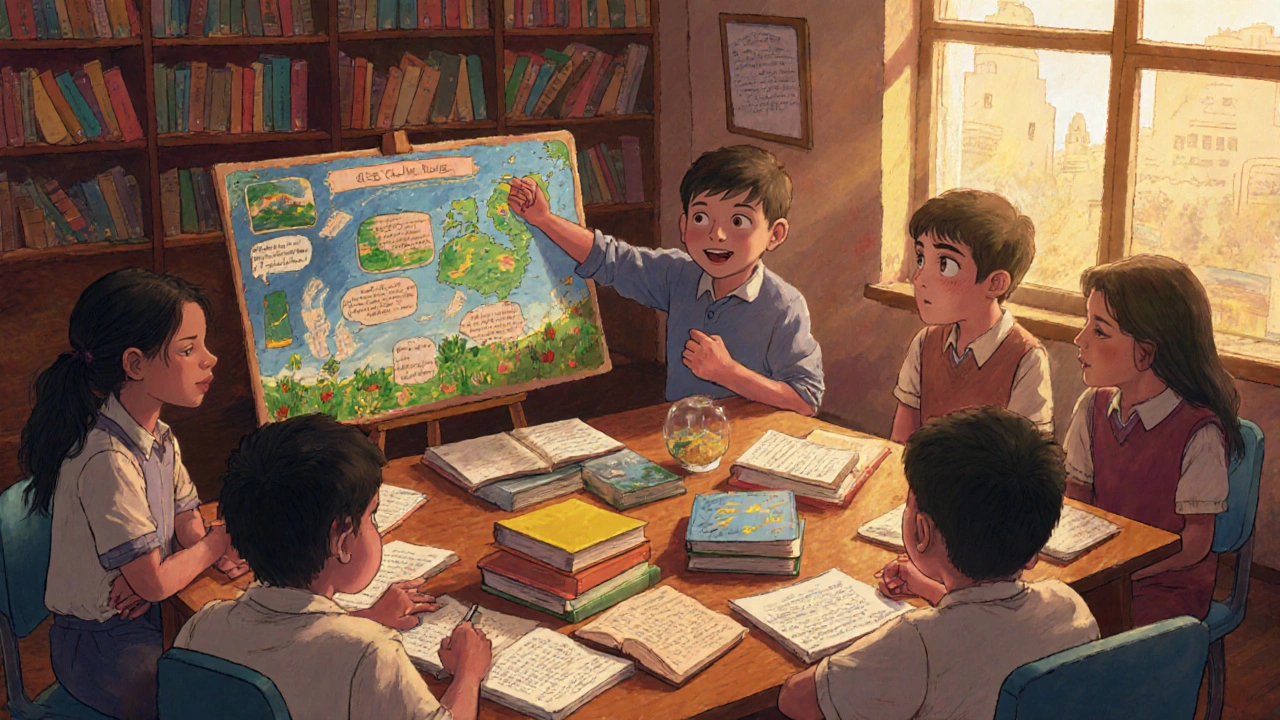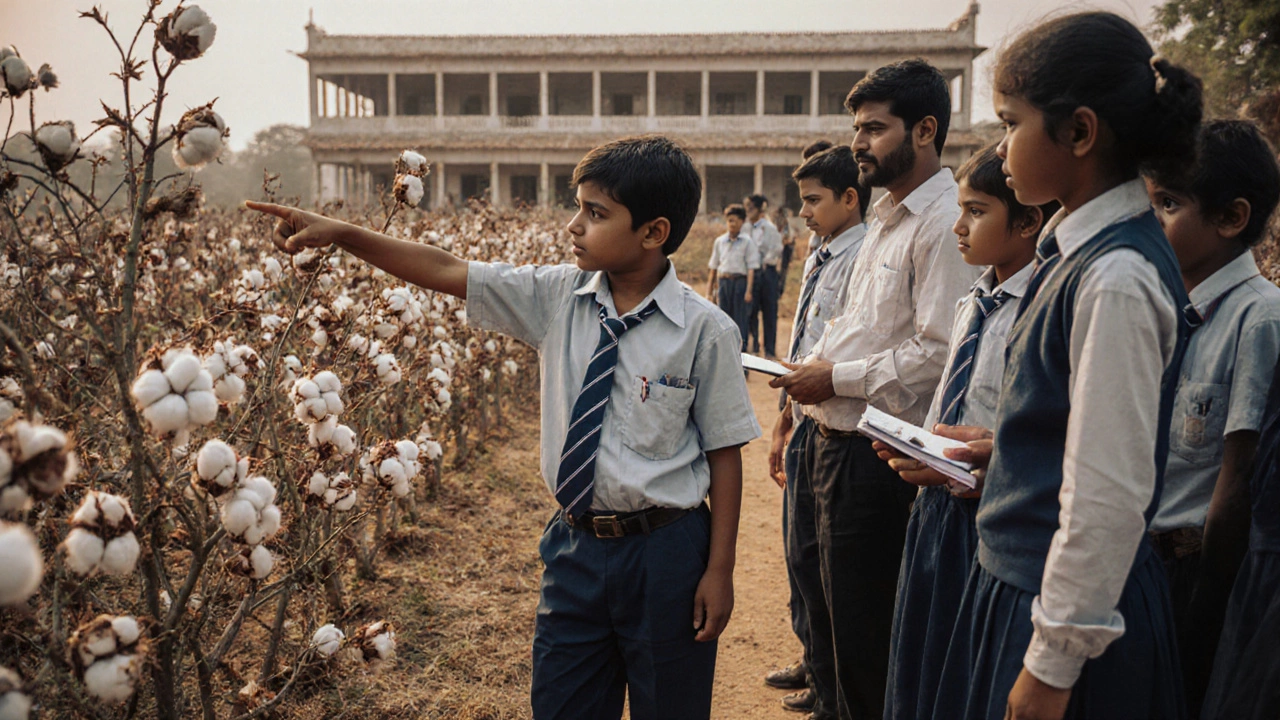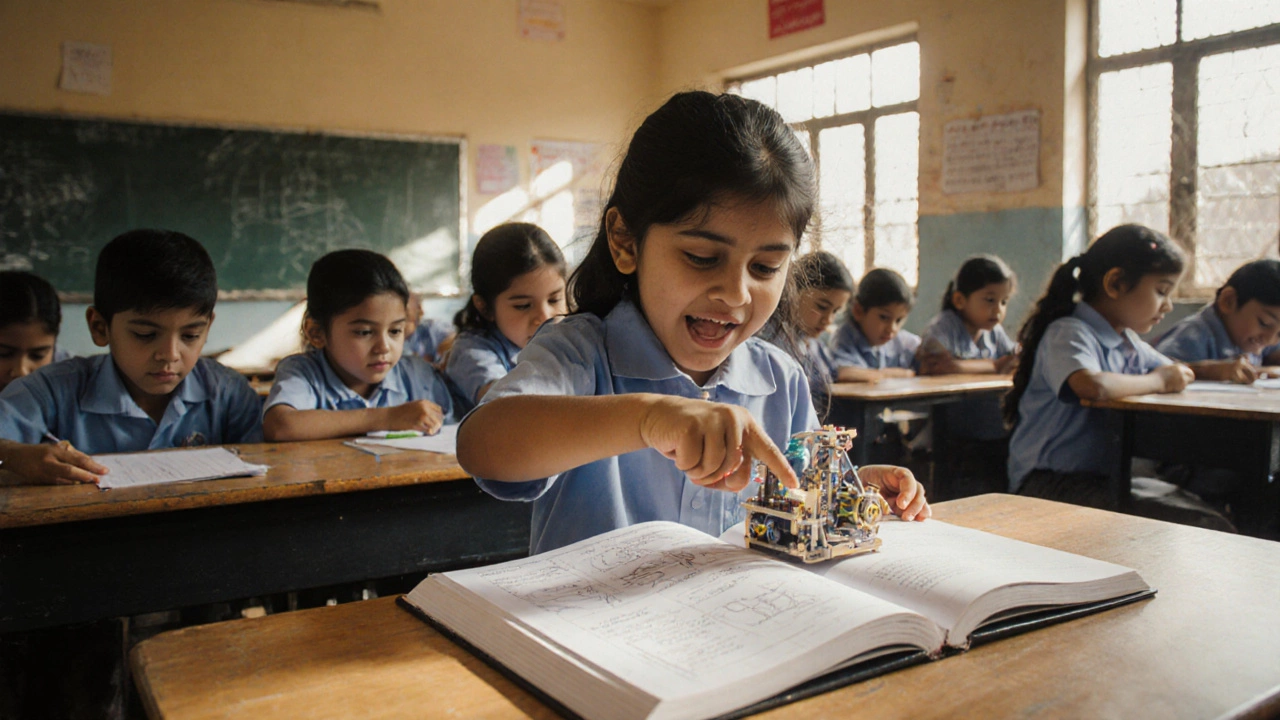When you’re picking a school for your child, the syllabus matters more than you think. It’s not just about textbooks and exams. It shapes how your kid thinks, solves problems, and even talks about the world. In India, three big syllabi dominate: CBSE, ICSE, and state boards. Each has strengths, and the "best" one depends on your child’s rhythm, your family’s goals, and where you see them in five years.
What Makes a Syllabus "Best" for Kids?
There’s no single answer. A syllabus isn’t good because it’s tough or easy. It’s good if it matches how your child learns. Some kids thrive with structured, step-by-step learning. Others need space to explore, ask questions, and connect ideas across subjects. The best syllabus for a 7-year-old isn’t the same as for a 14-year-old.
Look at three things: depth, flexibility, and real-world connection. Does the syllabus make science feel like a lab experiment or just a list of facts? Does it let kids write about what they care about, or just memorize dates? Does it build confidence, or just test memory?
CBSE Syllabus: The National Standard
The Central Board of Secondary Education (CBSE) is the most common syllabus in India. Over 20,000 schools follow it, from small towns to big cities. It’s designed for mobility - if your family moves from Chennai to Delhi, your child won’t be lost.
CBSE focuses on clarity. Subjects are broken into clear units. Math is taught with step-by-step problem solving. Science links theory to practical applications. English grammar is strict, but writing tasks are simple and structured. This makes it ideal for kids who need routine and predictability.
It’s also the go-to for competitive exams. The pattern of JEE, NEET, and Olympiads mirrors CBSE’s style. If your child might aim for engineering or medicine, CBSE gives them a head start. The NCERT textbooks are the foundation for almost all national-level prep.
But CBSE isn’t perfect. It can feel rigid. Creative expression, like open-ended projects or long-form essays, isn’t always encouraged. Some kids feel boxed in.
ICSE: Depth Over Speed
The Indian Certificate of Secondary Education (ICSE), run by CISCE, is known for being more detailed. It’s common in private schools in metros like Chennai, Mumbai, and Bangalore.
ICSE covers more topics in every subject. History isn’t just dates - it’s causes, cultures, and debates. English isn’t just grammar - it’s literature, poetry, and critical analysis. Science includes more lab work and research projects. Students often write longer answers and essays.
This helps kids who think deeply, ask "why?" a lot, and enjoy reading. If your child loves books, debates, or art, ICSE gives them room to grow. It builds strong communication skills early.
But here’s the catch: the workload is heavier. A 10-year-old might have 6-7 subjects with detailed syllabi. Some kids burn out. And if you move to a smaller city, finding an ICSE school becomes harder.

State Boards: Local, Practical, and Varied
Each state has its own board - Tamil Nadu State Board, Maharashtra Board, UP Board, etc. These are the most affordable and accessible, especially outside big cities.
State boards focus on local context. Science lessons might include local crops or rivers. History covers regional rulers and festivals. Language learning often includes the state’s mother tongue alongside English and Hindi.
This makes learning feel real. A child in Coimbatore learns about cotton farming because it’s part of their world. A child in Lucknow studies Mughal architecture because it’s right outside their door.
The downside? Quality and depth vary wildly. Some state boards are excellent. Others lack updated textbooks or trained teachers. And if your child plans to take national exams later, they’ll need extra coaching to bridge the gap.
How Do They Compare in Practice?
Let’s say your child is 11 and loves building things. In CBSE, they’ll learn about simple machines in a textbook and solve 5 problems. In ICSE, they’ll design a model, write a report on how it works, and present it. In a state board, they might visit a local workshop and write about the tools they saw.
Here’s how they stack up:
| Feature | CBSE | ICSE | State Board |
|---|---|---|---|
| Subject Coverage | Focused, streamlined | Comprehensive, detailed | Varies by state |
| Language Focus | Grammar + basic writing | Literature + critical analysis | Local language + English |
| Science Approach | Theory + lab basics | Experiments + projects | Practical + local examples |
| Exam Pattern | MCQs, short answers | Long answers, essays | Short + medium answers |
| Best For | Competitive exams, mobility | Creative thinkers, strong readers | Local context, budget-friendly |
What Do Parents in Chennai Really Choose?
In Chennai, most middle-class families pick CBSE. Why? It’s safe. It’s predictable. It’s what the coaching centers teach. But a growing number are switching to ICSE - not because they want to be different, but because their kids are bored.
I know a family whose daughter was top of her class in CBSE but hated school. She memorized everything but never asked questions. They switched to an ICSE school. Within six months, she was writing short stories, arguing about climate change in class, and reading novels for fun. She’s now 14 and planning to study environmental science.
On the other hand, I’ve met parents in Tiruvallur who chose the Tamil Nadu State Board because their child struggled with English. The state board’s bilingual approach gave the child confidence. Now he’s a star in math and science, and he speaks fluent English too.

What Should You Do?
Here’s how to decide:
- Watch your child. Do they love memorizing facts or asking "why"? Do they enjoy writing stories or solving puzzles?
- Think ahead. Do you see them taking JEE/NEET? Then CBSE is your friend. Do you want them to study abroad? ICSE’s global recognition helps.
- Check the school. A great ICSE school with passionate teachers beats a weak CBSE school. A good state board school in a supportive community can outperform a mediocre private one.
- Don’t fear change. Many kids switch from state to CBSE in Grade 6 or 9. Schools often help with the transition.
The best syllabus isn’t the one with the most pages. It’s the one that keeps your child curious, confident, and excited to learn. If your child is happy, asking questions, and still loves school after a year - you’ve already picked the right one.
Frequently Asked Questions
Is CBSE easier than ICSE for kids?
CBSE is often seen as easier because it’s more structured and has fewer subjects. But "easier" doesn’t mean better. CBSE moves faster, so kids need to keep up. ICSE goes deeper, so kids need to think more. A child who learns well with routines might find CBSE easier. A child who loves reading and writing might find ICSE more natural.
Can a child switch from ICSE to CBSE in Class 9?
Yes, many do. The biggest jump is in English - ICSE students write longer essays, while CBSE focuses on grammar and comprehension. Math and science are similar, but CBSE’s NCERT books are more concise. Most schools give a 1-2 month bridge course to help with the transition. The key is mindset: ICSE kids may need to adjust to more MCQs and less open-ended writing.
Does CBSE prepare kids better for IIT JEE?
Yes, directly. JEE questions are based on NCERT textbooks - the same ones used in CBSE. The exam pattern matches CBSE’s style: multiple-choice, formula-based problems, and clear steps. ICSE students can crack JEE too, but they often need extra coaching to adjust to the format. CBSE gives a head start without extra tuition.
Are state board syllabi good enough for higher education?
Absolutely - if the school is good. Many top universities in India accept state board scores. But if your child wants to apply to IITs, NITs, or medical colleges, they’ll need to prepare for national exams like JEE or NEET. That means extra coaching, because state boards don’t cover those exam patterns. The syllabus itself isn’t the problem - the gap in exam prep is.
Should I choose a school based on syllabus or teachers?
Teachers matter more. A passionate teacher in a state board school can make a child love science. A disengaged teacher in an ICSE school can make learning feel like a chore. Visit classrooms. Watch how students interact. Ask about projects, field trips, and how mistakes are handled. The syllabus sets the stage - but the teacher brings the story to life.
Next Steps for Parents
Don’t rush this decision. Spend a week observing your child:
- What subjects do they talk about at home?
- Do they enjoy reading books or solving puzzles?
- Do they get frustrated when things are too rigid - or too open-ended?
Talk to other parents in your area. Visit 2-3 schools. Ask to sit in on a class. Ask how they handle slow learners or gifted kids. The right syllabus won’t fix a bad school. But the right school with the right syllabus? That’s what changes a child’s future.
